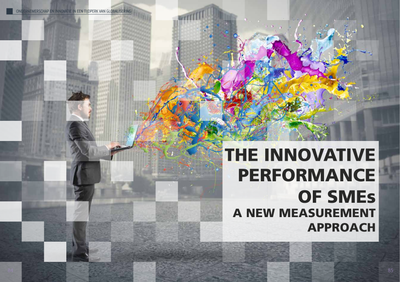DOCUMENT
DOCUMENT
Het belang van innovatie voor economische groei en het scheppen van werkgelegenheid in het MKB wordt erkend door zowel academici als politici. Er worden daarom programma’s ontwikkeld om innovatie te stimuleren. Met deze maatregelen ontstaat de vraag te bepalen of deze initiatieven succesvol zijn en zo ja, in welke mate. In de literatuur hebben we geen indicator gevonden die ons in staat stelt de mate van innovativiteit van MKB bedrijven te bepalen voor een dergelijke interventie en daarna. De hoofdvraag van ons onderzoek was dan ook: hoe kunnen we het effect van een interventie voor het bevorderen van de innovatiekracht van MKB-bedrijven meten? Kijkend naar de definities van innovatie zoals die zijn verzameld door King & Anderson (2002) hebben we vastgesteld dat een bedrijf innovatief genoemd mag worden als het met opzeten succesvol nieuwe ideeën implementeert. Succesvol wil in dit verband zeggen: het draagt bij aan de winst en dus aan de continuïteit van het desbetreffende MKB-bedrijf. Door de verschillende (bewuste) innovaties te identificeren samen met de ondernemer en te berekenen wat de winstgevendheid is geweest van de innovaties, kunnen we de ’innovatiewinst’ van de ondernemer berekenen. Dit bedrag delen door de omzet creëert een indicator waarmee de innovativiteit van de organisatie door de tijd gemeten kan worden. Wij stellen daarom de volgende definitie van innovatiekracht voor: KIKR = [ [Winst Innovatie1+Winst Innovatie2+ ... +Winst Innovatie5] / Omzet] x 100. De ratio kan alleen met voldoende betrouwbaarheid bepaald worden door een gestructureerd interview met de directeur/ eigenaar van de het bedrijf door een gekwalificeerde gesprekspartner. De auteurs realiseren zich dat dit gesprek op zichzelf misschien een interventie is, omdat de ervaring leert dat het innovatiebewustzijn van de ondernemer er door toeneemt. Om te bepalen of dit daadwerkelijk zo is, en om te testen of de KIKR inderdaad als bruikbare maat voor innovatiekracht kan worden gebruikt is vervolgonderzoek noodzakelijk. Desalniettemin zijn de auteurs van mening dat met de KIKR de innovatiekracht van bedrijven door de tijd heen gemeten kan worden en daarmee een bruikbaar instrument is om het effect te bepalen van interventies die innovatiekracht moeten vergroten. The importance of innovation as an engine for economic growth and the creation of employment opportunities is acknowledged by both academia and politicians. This makes the need for good innovation measures crucial. In the third edition of the Oslo Manual (2005), a need for proper indicators to capture the changes in the nature and landscape of innovation is voiced. According to the manual, a considerable body of models and analytical frameworks for innovation were developed in the 1980s and 1990s. Over time, the scope of what is considered as innovation has been widened and expanded to include marketing and organizational innovation. In this paper, we focus on innovative performance as a measure of success. This is part of ongoing research in the Netherlands in The Hague region. This research is framed within an approach based on action research. We have worked with 45 SMEs in four sectors. This has formed the basis for the conceptual development of innovative performance as a new metric for the measurement of a successful innovation. In this paper, we review our findings thus far and explore the validity of innovative performance as an appropriate indicator for measuring innovation within SMEs.
DOCUMENT

This article will discuss philosophical debates on economic growth and environmental sustainability, the role of management responsibility, and the risk of subversion to business as usual. This discussion will be framed using the concepts of Cradle to Cradle (C2C) and Circular Economy about sustainable production. The case study illustrating the danger of subversion of these progressive models discussed here is based on the assignments submitted by Masters students as part of a course related to sustainable production and consumption at Leiden University. The evaluation of the supposedly best practice cases placed on the website of the Ellen MacArthur Foundation or those awarded Cradle to Cradle certificate has led some students to conclude that these cases illustrated green-washing. Larger implications of identified cases of green-washing for the field of sustainable business and ecological management are discussed. “This is a post-peer-review, pre-copyedit version of an article published in 'Philosophy of Management'. The final authenticated version is available online at: https://doi.org/10.1007/s40926-019-00108-x LinkedIn: https://www.linkedin.com/in/helenkopnina/
MULTIFILE

Games zijn bedoeld voor vermaak, maar we kunnen ze ook opvatten als een vorm van cultuur. Ze vertellen iets over de samenleving waarin ze zijn gemaakt: al dan niet met opzet komen er via de verbeelding van de makers opvattingen over de samenleving in games terecht. Games zetten op hun beurt aan tot verbeelding, waardoor gamers zich mogelijk gestimuleerd voelen na te denken over die samenleving. Toch is het aannemelijk dat gamers daar weinig voor voelen, omdat dit een plezierige ervaring in de weg kan staan. Maar gamers blijken wel degelijk geneigd tot reflectie op de wereld om ons heen, over het leven, over goed en kwaad. Ruim driekwart van de gamers uit dit onderzoek zegt dat wel eens te doen. Tegen de verwachting is daarbij geen verschil te zien tussen reguliere gamers en professionals, zoals reviewers en game designers. Verondersteld werd dat die laatstgenoemden zich beroepsmatig vaker aangezet voelen tot reflectie op de wereld om ons heen. Vaker dan verwacht blijken gamers een kunstervaring te ondergaan bij het spelen van games. In de context van deze studie wil dat zeggen dat die spelers ‘tussen de regels door’ commentaar op de spel- en verhaalgebeurtenissen hebben opgemerkt, dat hen aan het denken zette over de wereld. Daarbij was geen verschil te zien tussen mainstream games en indiegames. De verwachting dat de meeste gamers vooral de bijzondere vormgeving van games noemen als reden om ze als kunst te bestempelen is ten slotte wel bevestigd. Dit laat meteen ook het verschil zien tussen de gangbare esthetische kunstopvatting en wat ik in deze studie onder kunst versta: het ervaren van een betekenisproces dat stimuleert tot reflectie op het leven.
DOCUMENT
